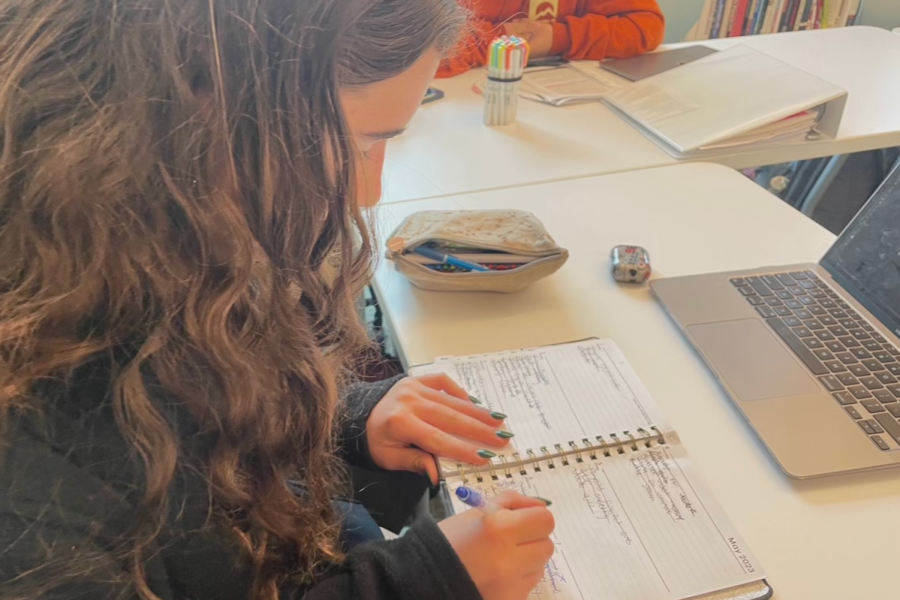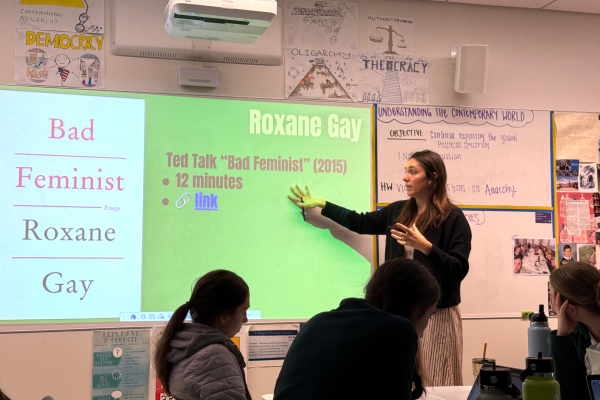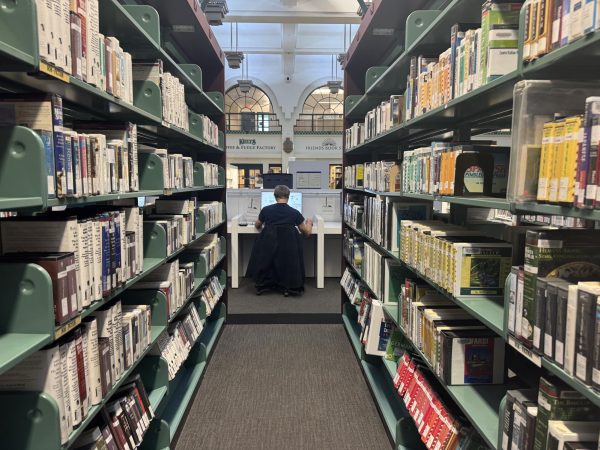Under pressure: Teens face high achievement culture, adults seek solutions
Photo credit: Allegra Carney
Freshman Olivia Hallinan-Gan fills out her crowded planner for the week. According to writer Jennifer Wallace, high achievement culture is harmful to teens because it adds to the pressure to succeed and can make students feel like they are not good enough.
Students are encouraged to receive high grades and work hard to be the best student they can be, but when this pressure becomes overwhelming, it feeds into high achievement culture. Feeling like giving up, feeling overwhelmed or feeling lost are all emotions that can come from this pressure.
According to Forbes, the pressure of this culture can become toxic and affects teens in their academic and everyday pursuits. A school environment that once was centered around learning can become one of competition for the best grades.
In a study conducted by Cross River Therapy, the United States was ranked number one in the world in student stress. The study revealed statistics about teen suicide and stress rates to bring the teen mental health crisis to light. The data was gathered from high schoolers across the globe. California was the top state in terms of student stress, with 55% of California’s students saying they feel pressure daily. The survey survey also found that 45% of all high school students worldwide feel stressed everyday.
Where Healthy Anxiety Turns Toxic
Jennifer Wallace is an award-winning reporter based in New York with three teenagers who attend competitive schools, which sparked her initial interest in high achievement culture. In 2019, she wrote an article for the Washington Post on how students attending high-achieving public and private schools across the country are at risk for increased anxiety and depression.
Wallace expanded on this topic in her upcoming book called “Never Enough,” which is coming out August 22, 2023, and while gathering evidence for her theory on high achievement culture, she initially sent out a survey hoping to receive results from 1,000 parents. She ended up gathering 6,500 responses and interviewing around 200 families across the United States. Wallace also met with many students who helped her find that this pressure comes from the classes they take but also who they surround themselves with, such as exemplary students.
“I spoke with some students who … were going to these high-achieving schools, and they were swimming in these extremely competitive ponds. And so even a kid in the bottom half of the AP Calculus BC course, one of the hardest math courses you could take, [they] could feel less than,” Wallace said. “There’s this hyper competition to achieve, and when you are competing against ‘really accomplished’ kids, it becomes this impossible bar that you feel like you have to pass.”
According to Wallace, another factor that contributes to high achievement culture is the environment and time that kids are growing up in. As colleges become more competitive to get into and everyday expenses rise, the pressure to be successful also increases. She said that while she was growing up in the ’70s, housing, groceries, education and other aspects of life were more affordable, so there was more room for mistakes. Wallace remembers it not mattering as much if one got a B or C on an assignment because the pressure to be successful wasn’t as predominate.
Wallace references the “crush of the middle class,” referring to how this was a turning point in high achievement culture. When taxes started to rise and interest rates started to decrease, the pressure to have a stable career and become successful increased.
“Then, in the 80s and 90s, globalization started happening there, and [many] government regulations … were lifted, which caused deep inequities between people that caused this rising inequality and this crush of the middle class, and so parents are absorbing these messages that we live today in a very hyper-competitive environment,” Wallace said.
Because teenagers are increasingly stressed at school with academics and extracurriculars, Wallace said, it is important to come home and have a break. She said, unfortunately, they do not get a break from this pressure. When teenagers receive constant reminders about school-related things, it starts to create toxic anxiety.
“When there’s the anxiety in school about performing on the tests, then you come home and there’s anxiety about your social media page and how many likes do you get and who didn’t like your social media image,” Wallace said. “And then a parent just can pile on with the anxiety on, ‘Did you study for that test?’ ‘How’d you do?’ So it’s the unrelenting pressure that causes the toxicity.”
Listen to the audio clip below to hear Jennifer Wallace discuss what motivated her to investigate high achievement culture.
Academic Pressure at Archer
Jerilyn Neshek has been a teacher at Archer for 13 years. She is the seventh grade dean and one of the seventh grade science teachers. Neshek doesn’t think that Archer has a competitive nature but also recognizes that she is teaching seventh graders, as opposed to high schoolers, who are under larger amounts of stress. Neshek said the reason why high schoolers may feel a more amplified pressure is because that is when grades start to “count.”
“In middle school, it doesn’t necessarily count. Those transcripts are not going to go to your colleges, but in high school, those transcripts are going to your colleges. How you score on something does impact your grade that is then going to be seen on our transcript,” Neshek said. “So I can see that you guys would have more stressed about your grades, where I think it’s a little bit more relaxed in middle school.”
Freshman Olivia Hallinan-Gan said the stress she feels to get a certain grade comes from receiving exemplary test scores previously. Because she continuously does well in school, her parents now have that expectation of her.
“My parents don’t necessarily give me the pressure but because I’ve done well in the past; they just expect me to do well, so they expect me to get A’s. They expect me to not get below an A-minus or that’s unusual for me,” Hallinan-Gan said.
Hallinan-Gan reflected on how at her elementary school, she didn’t feel anywhere near the same pressure that she does at Archer when it comes to grades.
“My elementary school was a progressive school; grades weren’t a big deal for me, and if I got five questions wrong in a test, I’d be like, ‘That’s fine,'” Hallinan-Gan. “Then, I came to Archer and I was like, ‘Oh no, I need to get all A’s or my self-confidence is going to be to the ground.’”
School Counselor Jaime MacDonald also said that when the self-criticism goes too far, people can lose sight of their self-worth and what is important to them.
“I think when we lose sight of what we are trying to achieve, and that should be for the intrinsic reward, then it becomes a bit unhealthy,” MacDonald said. “It shouldn’t be about trying to better. It should be about trying to better ourselves or stay focused on a goal that each of us has individually.”
After researching and learning about many schools across the country, including Archer, Wallace recognized how many of these schools are taking steps to help students navigate this pressure. Although progress is being made, she also said schools need to completely transition their culture surrounding academics in order to create real change.
“I think schools are trying to do the best they can to be buffers and so, doing this mental health day, raising awareness, that’s a drop in the bucket,” Wallace said. “What schools really need to do is to create climates where children can perform at their best, and I actually think Archer does a really good job of that.”
How and When to Stop Toxic Self-Talk
MacDonald said in order to combat toxic pressure, comparison and fear of judgment, it is important to recognize the pressure and stop it from evolving into something more toxic.
“’What if everybody laughs at me?’ Well, what’s the worst that [can] happen? Everybody laughs, and you get it wrong. And then you correct yourself, and you learn from it, and it’s not going to be the end of the world,” MacDonald said. “So instead, we talk back to that thought, and we say, ‘If I get it wrong, I will do try again, or if I have a question, I’ll ask the teacher.’”
MacDonald said another crucial step for combatting this pressure is reflecting on if the decisions that one is making are based on what an individual wants and not what others want for them.
“We have to continuously check in. Is this what I really want? Or is this what I think other people want of me? Whether it is my parents or it’s a teacher or college guidance or somebody famous in the media, it has to be, is this what I really want, and is it actually really filling me up,” MacDonald said. “And if the answer is yes, and it’s also in line with what everybody else wants, wonderful. If it’s not, you have to do some deeper digging.”
Wallace said she wants her book to be a resource to tell kids they are not alone in feeling this pressure. She said she thinks engaging in conversations and talking openly about the toxicity surrounding high achievement culture will help resolve these challenges.
“What I’m hoping to do in this book is to allow [kids] to contextualize what they’re feeling, so that they don’t internalize it and feel like they’re the only ones feeling like they’re never enough. They’re not the only ones feeling this toxic pressure,” Wallace said. “This is everywhere out there, and we need to come together and have conversations — honest conversations — about the messages being sent and the lies being sent to youth and to their parents.”

Allegra Carney joined the oracle as a staff reporter in 2022. She is a member of Archer's upper school choir and enjoys learning about science and history....








